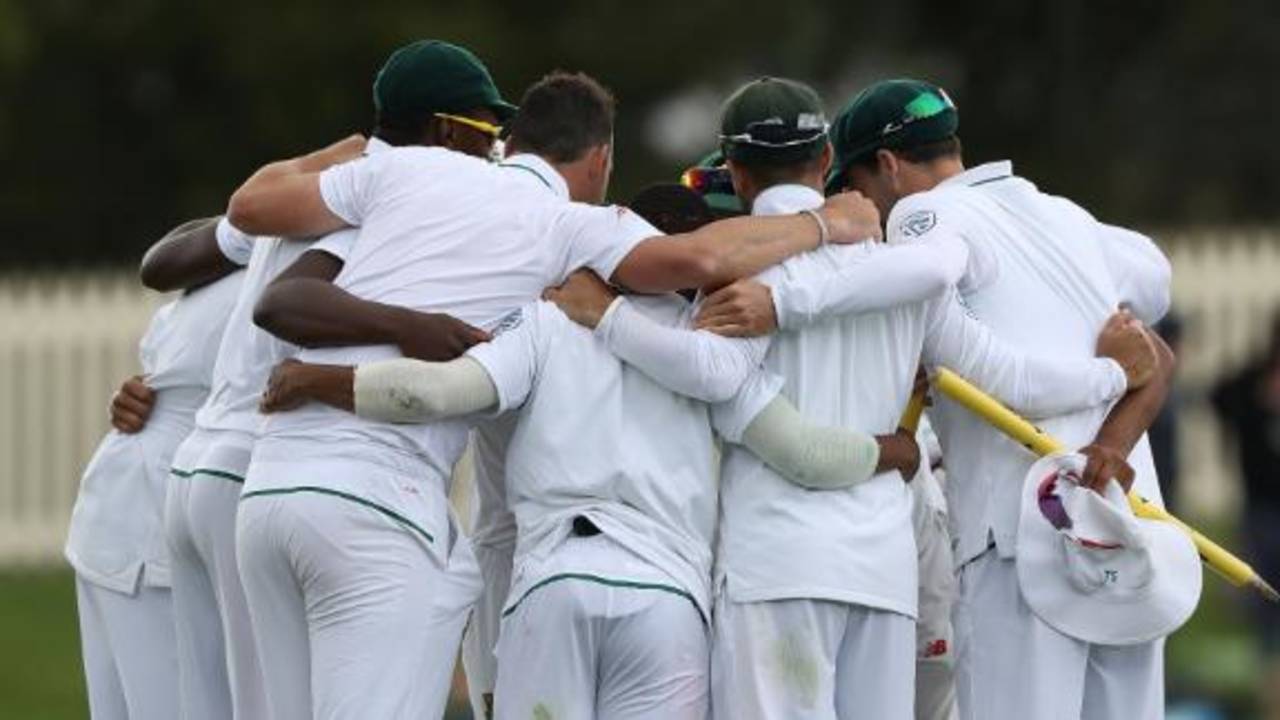For the first time since the opening day
in Perth, South Africa's defences have been tested, and this time they have held up strongly. The entire squad and support staff
stood in solidarity with stand-in captain
Faf du Plessis against what they see as victimisation after their third successive
series win in Australia.
Let's start with the obvious. Whether or not du Plessis is found guilty of altering the condition of the ball - which, when indulged in, is to encourage reverse swing - is irrelevant to the outcome of the series.
Vernon Philander would still have found seam movement either way, Australia would still have lost. So South Africa see
the charges as taking the shine off a deserved win and an attempt to diminish their success.
Hashim Amla said as much when he
called the episode "sour sweets" in an extraordinary press conference at the MCG. Amla was accompanied by every member of the touring party, who stood with him as he delivered the South African response to a charge that, at that stage, had not even been laid. Amla said he was not aware that the ICC was reviewing the footage, and used strong words to dismiss the allegation. Words like "joke" and "ridiculous", which came in response to similarly harsh words in the Australian media.
When the footage of du Plessis was first released on Wednesday, newspapers carrying the story described du Plessis as a "confessed ball-tamperer" and the team as "notorious" for their working of the ball. Every major publication carried several stories on it, and it received substantial airtime on television. South Africa are not used to that sort of coverage: the media landscape is much smaller back home, and much softer in India - the other place where they are confronted with mass reportage.
They are understood to be seeing it as their fight against the Australian fourth estate, without whose intervention this would not have come to light. Not even the match officials knew that du Plessis was shining the ball with saliva that had also allegedly been in contact with a mint. When it came to their attention via the media, the 18-hour window for them to report it had lapsed but Cricket Australia could still have laid a complaint. The board did not, and made clear it had no intention to do so. Instead, the ICC chose to review the footage of its own volition and chief executive David Richardson has since laid the charge. Given that course of events, one can see why South Africa feel they've been unfairly treated.
Exactly how South Africa will get themselves out of this with reputations unscathed remains to be seen but, for now, there is some space to understand why they're feeling a little hard done by
This is not the first time that South African players being caught on camera has spun into a controversy beyond the actual incident. When Philander was fined for ball-tampering in Sri Lanka in 2014, Ten Sports
had visuals of him scratching the ball and picking the seam on the third day, and alerted the match referee, Jeff Crowe. Philander was subsequently charged and fined 75% of his match fee. The pictures were not aired publicly until the fifth day and insiders said Cricket South Africa had put pressure on Ten Sports not to broadcast the visuals. When Sri Lanka Cricket found out, it made its own demands to air the footage.
A year before that, Ten Sports caught du Plessis rubbing the ball near the zipper on his trouser pocket in the UAE, in a match against Pakistan. The television umpire alerted on-field officials, who awarded penalty runs against South Africa, and du Plessis
was later fined. CSA was furious with Ten Sports at the time and threatened their rights and access.
On both those occasions, the player involved did not contest the charge and accepted the punishment, although in 2013, du Plessis insisted he did not act with intent. That seems likely to be the defence this time as well, except that du Plessis is contesting the charge and will need legal representation for a hearing. South Africa are in conversation with their counsel and will begin preparing a case.
Arguing that they are the victims of a media war is not going to work. The law on using an artificial substance to shine the ball is clear: it's not allowed. Even though, as Amla pointed out, players walk out onto the field having consumed any number of things, and it's an open secret that the tactic does get used (Marcus Trecothick wrote as much in his autobiography), using the "everybody does it" defence is also unlikely to earn South Africa any advantage.
Exactly how they will get themselves out of this with reputations unscathed remains to be seen, but for now there is some space to understand why they're feeling a little hard done by. They have already had to deal with racist graffiti aimed at Amla on the fence inside Bellerive Oval, and a public outcry from home when Ian Chappell, on commentary, responding to Ian Healy's questions about how Kagiso Rabada developed his pace, said: "You'd have to ask all the batsmen in his village." The word "village" was the one people took issue with. Rabada is from a privileged city background in Johannesburg, and the stereotyping left a bitter taste in South African mouths.
Now Australian mints could do the same in another reminder that a tour here is never only fought on the field. That's part of what makes it so challenging. It is also part of what makes winning here so sweet.
